Olga Godim's Blog, page 34
December 3, 2014
Complete or not complete: that’s the question
 A post for the Insecure Writer’s Support Group
A post for the Insecure Writer’s Support Group
Recently, I submitted a short story to a magazine, and it got rejected. No surprise there, it happens to every writer. What was a surprise was the reason for the rejection. The usual rejection is worded something like: “Thank you for submitting your story to us. Unfortunately, that’s not what we are looking for at the moment.” Instead, my rejection email stated that the editor liked the story but thought it was incomplete. “Next time send a complete story,” she said.
I was puzzled. I was sure it was complete. I didn’t try a cliffhanger. In the beginning of the story, I promised to deliver my heroine from point A to point B, and I did. Of course, she has to figure out where to go from point B, but that’s another story entirely. Or so I thought.
I asked some friends to read the story and comment whether or not it was complete. I was sure they would side with me and say that the story was complete. It didn’t happen. Everyone who read the story said: “Yeah, interesting story, but I’d like to know more about the characters. Did they find xxxx? Did they reach yyyy? What happened next?”
Obviously, if several people say the story is not finished, it is not. I have to think up another ending. I must continue the story, and I have nothing against that. I know when happened to the characters next. But why didn’t I see it myself?
There is another quandary too. The story is long as it is, over 8000 words already. If I continue the way it deserves, it would stop being a short story. Should I try to make it a novella? Or should I just attach a slap-dash ending – another page or so – and call it ‘done’?
Do other writers wrestle with such questions? Has it ever happened to you? How do you solve such problems? What constitutes an ending everyone agrees upon?

November 26, 2014
The name is���Hynrair Laithugz
I wrote this post for another website. It generated some interest, so I’m re-blogging it here. Don’t you want to wince at the name in the title?
Don’t you want to wince at the name in the title?
Character names are important in fiction. They help create an atmosphere. They reflect the historical era or the locale where your characters live. Of course, writers are free to choose any names for their characters, but I���d suggest a few guidelines. As I���m predominantly a fantasy writer, most of my guidelines apply to my genre.
Often sci-fi and fantasy writers make up their character names to sound otherworldly, so everybody would know the action takes place elsewhere. It���s a worthwhile practice with a long tradition in the genre, but the names should still be readable. They shouldn���t pile up consonants, like some old Celtic names. A few random examples(1) include Amerawdwr, Kyvwlch, or Arglwyddes.
Even if you���re Welsh, resist the temptation to use such mouthfuls, unless you���re writing a historical novel set at the time when such names were commonplace. If the reader can���t pronounce the hero���s name after two glances, he gets irritated. I know I do.
In general, non-English sounding names are tricky and should be used with caution. I made such a mistake when I called the heroine of my fantasy novel ALMOST ADEPT Eriale. I���m not sure how most of my readers would pronounce her name(2), but if a name needs a pronunciation guide, it might be better not to use it.
There are websites that generate odd-sounding names, and some writers use them or similar names for their speculative fiction novels. Below is a short list of names lifted from one such site(3):
Nechynr Neic Spanryar Dusesp
Irurh Uemh Laicchair Saicspir
Atoc Uemh Laubir Balgzed
Ceca Neic Hynrair Claubarc
I wouldn���t use such names for any of my novels, wherever they are set: in space, underground, or in an imaginary, quasi-medieval kingdom. The reader gets lost after the third twist of the tongue.
In one of my short fantasy stories, I called my heroine Aglaya. It���s not a usual English name, it has a vague exotic feel (after all, the story takes place in a world of my own creation), but you still can recognize and pronounce it from the first glance. This name doesn���t distract readers from the story.
On the other hand, for a monster or a villain, it might be a good idea to think up an appropriately outlandish name. Maybe here, that name generator site could come in handy. I can���t see Liarsob Ssynec Tleuscrocr as a hero, but he could be a great dragon or an evil sorcerer with the delusions of grandeur.
Another guideline concerns any genre, not just speculative fiction. If you have a few leading characters in one story, make their names look and sound different. If you have three girl friends in one novel, it���s not recommended to call them Sarah, Sally, and Sadie, unless it���s absolutely necessary for the plot. After a few first pages, the reader should be able to know who is talking from the shape of the name, without reading it each time. A good practice is using different first letters and varying the number of syllables in the names of your characters, e.g. Sarah, Dorothy, and Liz.
How do you choose your characters��� names? What are your guidelines?
~~~~~~~~~~~~
(1) Sources:
(2) When I say her name, I pronounce both first and last E, and the middle two vowels sound like in the name Tia.
(3) Source:

The name is…Hynrair Laithugz
I wrote this post for another website. It generated some interest, so I’m re-blogging it here. Don’t you want to wince at the name in the title?
Don’t you want to wince at the name in the title?
Character names are important in fiction. They help create an atmosphere. They reflect the historical era or the locale where your characters live. Of course, writers are free to choose any names for their characters, but I’d suggest a few guidelines. As I’m predominantly a fantasy writer, most of my guidelines apply to my genre.
Often sci-fi and fantasy writers make up their character names to sound otherworldly, so everybody would know the action takes place elsewhere. It’s a worthwhile practice with a long tradition in the genre, but the names should still be readable. They shouldn’t pile up consonants, like some old Celtic names. A few random examples(1) include Amerawdwr, Kyvwlch, or Arglwyddes.
Even if you’re Welsh, resist the temptation to use such mouthfuls, unless you’re writing a historical novel set at the time when such names were commonplace. If the reader can’t pronounce the hero’s name after two glances, he gets irritated. I know I do.
In general, non-English sounding names are tricky and should be used with caution. I made such a mistake when I called the heroine of my fantasy novel ALMOST ADEPT Eriale. I’m not sure how most of my readers would pronounce her name(2), but if a name needs a pronunciation guide, it might be better not to use it.
There are websites that generate odd-sounding names, and some writers use them or similar names for their speculative fiction novels. Below is a short list of names lifted from one such site(3):
Nechynr Neic Spanryar Dusesp
Irurh Uemh Laicchair Saicspir
Atoc Uemh Laubir Balgzed
Ceca Neic Hynrair Claubarc
I wouldn’t use such names for any of my novels, wherever they are set: in space, underground, or in an imaginary, quasi-medieval kingdom. The reader gets lost after the third twist of the tongue.
In one of my short fantasy stories, I called my heroine Aglaya. It’s not a usual English name, it has a vague exotic feel (after all, the story takes place in a world of my own creation), but you still can recognize and pronounce it from the first glance. This name doesn’t distract readers from the story.
On the other hand, for a monster or a villain, it might be a good idea to think up an appropriately outlandish name. Maybe here, that name generator site could come in handy. I can’t see Liarsob Ssynec Tleuscrocr as a hero, but he could be a great dragon or an evil sorcerer with the delusions of grandeur.
Another guideline concerns any genre, not just speculative fiction. If you have a few leading characters in one story, make their names look and sound different. If you have three girl friends in one novel, it’s not recommended to call them Sarah, Sally, and Sadie, unless it’s absolutely necessary for the plot. After a few first pages, the reader should be able to know who is talking from the shape of the name, without reading it each time. A good practice is using different first letters and varying the number of syllables in the names of your characters, e.g. Sarah, Dorothy, and Liz.
How do you choose your characters’ names? What are your guidelines?
~~~~~~~~~~~~
(1) Sources:
(2) When I say her name, I pronounce both first and last E, and the middle two vowels sound like in the name Tia.
(3) Source:

November 5, 2014
Are you First Class?
 A post for the Insecure Writer’s Support Group
A post for the Insecure Writer’s Support Group
In February 2014, one of the best known American literary agents Donald Maass published an article in Writer Unboxed. In it, he discussed the state of the publishing industry as he sees it. Read the full article here.
According to Mr. Maass, writers now are divided into three classes. The lowest class, “Freight Class,” consists of self-published writers and writers with micro-presses. Mr. Maass has nothing good to say about them. They are a “nimble army of small, warm-blooded mammals whose claws are the sharp, smart, flexible tools of electronic publishing.”
The middle class, “Coach Class,” is… well, the middle. Better than the Freight Class but not by much.
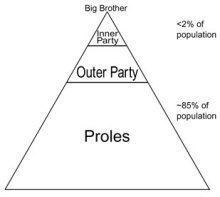
This graph of social classes from 1984 by George Orwell describes Mr. Maass’s writers’ class system perfectly. Only the labels are different. (Image in Public Domain)
The top class, “First Class,” is where all the bestsellers published by the Big Guns are. Mr Maass sings dithyrambs to them. “…fiction is characterized by memorable characters, unique premises, story worlds instantly real, plots that grip even when slow, gorgeous writing, and themes that surprise, challenge and change us. Not only do we read every word, First Class writing makes us whistle in admiration. Characters are not only likeable and self-aware, but also follow a singular destiny. First class novels shake our way of thinking, challenging us to see the world in new ways. They confidently break rules, may transport us to unlikely cultures and times, teach us things we knew little about, and always feel utterly unique. Each novel creates its own genre.”
I belong somewhere in between Freight Class and Coach Class. I have two novels published by Champagne, a small but respectable e-publisher, and I published a book of short stories myself. Do my books sell well? No. Everything Mr. Maass said about the marketing problems writers of the two lower classes face is true. Distribution and marketing (or rather the lack of both) is killing us.
Distribution is a friend of big publishers. “Like giant banks that have discovered that banking is boring and the real money is in gambling, big publishers are now free to focus on the high-risk/high-reward game of finding the next Twilight, Hunger Games, Game of Thrones or Fifty Shades of Grey.”
Are all the writers in the big league really as good as Mr. Maass claims in the quote above? Do readers “whistle in admiration” at Twilight or Fifty Shades of Grey? No, not everyone, not even the majority of readers. Just the opposite. Cultured and experienced readers scoff at those books. Their commercial success doesn’t mean they have outstanding literary value, or any literary value at all. Still, their authors are First Class, while I’m Freight (or maybe Coach). Does it imply my novels are worse than theirs?
I have to say No again. Sure, some of the best writers in my genre are better than me. On the other hand, some of the recent hits are dismal in terms of characters, plots, or even editing, much worse than me. I’m somewhere in the middle, I think.
Why doesn’t it cheer me up? Because all the First Class stories sell by millions, while mine don’t sell at all, and I don’t have a way to change the situation. Nobody knows about my novels, even though I ‘m trying to market them. Could I improve the quality of my writing or my stories? Sure. I’m constantly learning and improving. Does it really matter? No, it doesn’t. I don’t have a way to move into First Class. I want to, oh yes. Everyone of us wants to; Mr. Maass is right about that, but his definition of the First Class is faulty. First Class isn’t about “gorgeous writing” or “themes that surprise, challenge, and change us,” not always anyway. It’s about stories that sell.
Alas, I don’t write what sells. I write from my heart. It should make me feel smug and superior, but for some reason, it doesn’t. Perhaps for my next novel, I should forget about story arch, hero’s emotional depth, and sentence structure and concentrate instead on what is selling: a tale about a shallow girl, preferably in bikini, and a hunky vampire. There’re scores of those in bookstores, where First Class resides. Would it boost me to First Class too?


November 3, 2014
Inter-Literary Fantasy Cafe
The Inter-Literary Fantasy Cafe is always full. It’s a meeting place for characters from different fantasy novels, created by different writers. A hobbit can meet a werewolf here. A dragon can chat with a vampire. A fairy and an elf can have cake together. They often gossip about their worlds and (uh-uh) their authors.
That was where a character from Legacy of Mist and Shadow by Diana Wicker, Arwyn, met with Eriale, the protagonist of my novel Almost Adept. After ordering coffee and pastries, they talked.
~~~~~~~~~~~~~~~~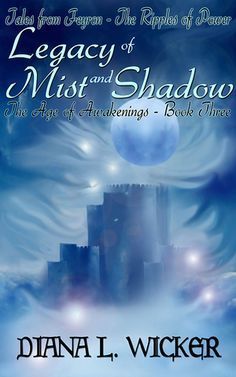 Arwyn: Tell me about magic, Eriale. How does it work in your story? You’re a mage, right? What can you do with your magic?
Arwyn: Tell me about magic, Eriale. How does it work in your story? You’re a mage, right? What can you do with your magic?
Eriale: Well, in my story, magic is energy. As to what I can do with it—anything that can be done without it. For example, if you want to carry a heavy load to the other side of the kingdom, you can do it using a horse and a wagon. And lots of time. Or you can employ a mage to transport your cargo much faster. The horse would spend energy pulling the wagon. It would need to eat and sleep to replenish its strength. So would a drover. A mage is no different. He compacts the time and space needed for transportation and uses the same amount of energy for the same job, just in a much shorter time. He pulls this energy out of himself. Of course he is tired and hungry afterwards.
Arwyn: Where does your magic come from?
Eriale: My body generates it.
Arwyn: Oh, yes. Our magic is also energy based, but we tend to only get really exhausted if we are nearing our limits. A good meal, nap, or restorative tea generally fixes everything right up. It is possible to overextend, even unto death, but that is a rare thing indeed. Although, I have friends who have come very close in our adventures. What if you overextend? Can a mage in your world use more magic than his body generates?
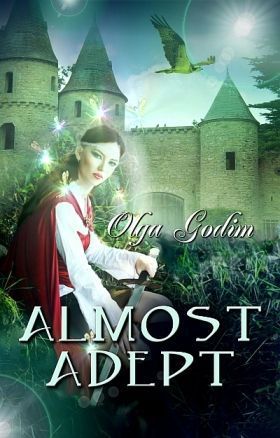 Eriale: He can’t, unless he resorts to blood magic. Then he can, if he extracts the energy from the pain and death of others. It’s easy magic, but…it’s dirty. Blood magic corrupts a mage’s soul. [She shivered.] It makes me want to puke, like poison.
Eriale: He can’t, unless he resorts to blood magic. Then he can, if he extracts the energy from the pain and death of others. It’s easy magic, but…it’s dirty. Blood magic corrupts a mage’s soul. [She shivered.] It makes me want to puke, like poison.
Arwyn: Blood magic…I have never heard of such. Surely that would be something brought from the shadows. [She takes a deep breath and shakes her head, as if to clear the thoughts.]
Eriale: Yes. Let’s not talk about it. Tell me about your magic.
Arwyn: Compared to yours, my magic is not very exciting. I am from a creation clan, a grower. I can call to plants, and they respond to me. Generally it’s a magic used for farming and gardening and such. Nothing terribly noteworthy. That’s why I have apprenticed to the scholars. I have no interest in being a farmer’s wife.
Eriale: I think earth and plant magic is great, better than anything I can do. It nourishes the land. I don’t have it and I envy you a little, although I understand your wish to become a scholar. What are you going to study? Are you going to a university? Or is there an apprenticeship system?
Arwyn: University…I don’t think I’ve heard of such before. At your fifteenth summer, you can pledge to the scholars to study the lore of Feyron. The apprentices serve for five years before they are tested to see if they are ready to become scholars. Most girls tend to leave about then. Some become clan storytellers, others marry and start a family. Those who do not pass their test but wish to stay on become scribes.
My friend Neria, a summoner of Vocare, is working with the scholars in the Hall of Gifts, discovering which of the relics from the days of yore have stories to tell. My friend Orabelle has found a passion for the lost worlds beyond the darkened gateways. Me, I like the old tales of the forgotten times. Most of the scholars seem to have more interest in the clan histories and uses of magic, but I like the children’s tales myself.
What about you? How did you learn to use your magic? Do you have scholars or an academy that teaches you?
Eriale: My father is a magic Adept. He owns a magical school, and of course he taught me. Now, when I’m fully trained and an Adept myself, I help him tutor younger students in various applications of magic. Kids from all over the kingdom come to our school, or rather their relatives bring them, when their magic manifests.
Arwyn: What if something can’t be done without magic? Like turning a man into an animal? Is it possible with magic in your world?
Eriale: Why? Do you want to turn someone into a frog? [She grinned.]
Arwyn: No. [She snickered.] I heard a rumor that some crazy mage in your story turned a duke into a goat. I thought they were joking. You can’t really use your magic to turn one living thing into another, right?
Eriale: Ah. You can transform one living being into another, but it’s a very complicated spell and a brutal one. It takes lots of power and lots of knowledge. You have to learn every detail of the anatomy of your original creature and the target creature. Otherwise, you’ll create a monster. And the overall masses of both creatures should be the same. You can’t turn a man into a tiny frog. Where would the extra mass go? Unless you want a frog the size of a man. [She hesitated.]
I didn’t turn him into a goat, honestly. I used an illusion to make his head look like a sheep’s head. A complete illusion too, so even he was deceived. But he is a nasty piece of work, that guy. He deserved it. And I only set the spell to last one week. I was merciful.
Arwyn: Tell me more. What happened with this sheep incident?
Eriale: That’s actually how my story started. The guy was wooing me in my face—he could be very charming—and spreading rumors behind my back. He didn’t really care about me but he wanted my royal connections. When I learned about his duplicity and confronted him, he decided to secure his position by raping me. He thought if he did, I would have no choice but to marry him. Stupid man. Nobody can rape a magic Adept. I was so angry with him I turned him into a sheep. But he is a duke’s nephew, and the entire duke’s family was angry with me. They wanted retribution. I had to leave home for a while, until the furor died down. There was an article about it in our local news sheet The Looking Glass:
Arwyn: Truly you must be from a sorcerer’s line, for there is only one clan of Faie that can control all forms of magic, and I’m not certain that even they can transform a living being into another.
Eriale: But you do have shapeshifters in your world?
Arwyn: Yes, we do have a clan of shapeshifters, but their size changes to match the true form of the new animal. From what I understand, it does take a great deal of study and practice, and most of them only learn a handful of forms. Almost always one of the forms is a flier. They all seem to love to fly.
Eriale: I love flying. No, I can’t really fly but I can levitate. I must tell you that it takes lots of magic to fight the land’s gravity. Enough about me. What are you going to do when you finish your studies? Do you want to teach? Do research? Travel? How do the scholars make their living in your world?
Arwyn: Make a living? I’m not certain I understand the question. Everyone helps everyone else. Farmers farm, herders herd, fishermen fish, creators make things, the Court of Clans arbitrates, the scholars teach, everyone does the job they are best suited to. And, as people age and grow tired, they step aside to their rest and let the younger generation tend to things.
My favorite studies are the old tales, the stories that storytellers tell to the littles who are too small to attend summer academy yet. Many from the Worlds Beyond think them to simply be fanciful tales, fairy tales some from Worlds Beyond will say. I would like to find the truths behind them, and maybe more relics of forgotten things. I have found relics contain wondrous stories.
As to what I would like to do, I’m not really certain. Most people from Feyron don’t travel much, and I’ve been both to the Beyond and a World Beyond so far. I suppose we will have to wait to see how my test with Lord Grypos goes when I have completed my apprenticeship.
Do you travel?
Eriale: Yes, mages in our world travel a lot. They work for hire, like everybody else. As you said, farmers farm, fishermen fish, and then they sell the products of their toils and buy things they don’t produce. The same with mages: they sell their services and get paid. That’s why they travel. I like traveling. That’s how I met a men I fell in love with. Well, maybe not in love, precisely, but I liked him a lot. Do you have someone you love, a guy or a girl?
Arwyn: Someone I love? Well, I…I would never have expected such a question. It’s not the sort of thing one usually talks about, at least not with a stranger.
Growing up I was paired with an earth-child, and together we helped set the fields for planting with a water-child each season. It is considered traditional to marry your planting day partner when you come of age, but after my sister’s big adventure, I realized I wasn’t ready to pledge before the Sacred Fire, and I had little interest in becoming a farmer’s wife. That’s when I pledged to the scholars.
Now, I have a best friend, who is sort of a…what did you say…a guy, I guess. But, he’s not actually of the Faie. He’s a guardian-child, the son of Lady Kali herself. He’s tall, with dark eyes that go on forever and hair as silky and fine as a little babe. He is so excited to learn just everything, and he takes good care of me when we find ourselves on a…misadventure.
He’s mute, can’t make a sound louder than a raspy barking when he’s in puppy form, but I can hear his thoughts. I’m the only one that can actually hear his voice, at least that I know of. [She blushes.] I don’t know what I’d do without him.
~~~~~~~~~~~~~~
To learn more about the authors and their books, roam this website or check out Diana Wicker’s website.


October 23, 2014
Birthday with a dragon
On Oct 23 last year, I wrote my first post here. Many marketing gurus say that a writer’s website should be her foremost sales tool, but my blog isn’t that. I don’t sell anything. My website serves mostly as an information depository. People who want to know what I do as a writer, what I think, or who I am, can log on, stroll around, and satisfy their curiosity.
My blog is rather eclectic. Instead of being a sales tool it’s become my way of opening up to the world. I learned to tell what I think on my blog – something I seldom do in real life. I’m a very quiet person but I learned to express my opinion on my blog, even when nobody asked for it (oh horror). And of course, as I’m a fantasy writer, most of what I write on my blog pertains to the fantasy genre.
Sometimes I give voice to other fantasy writers and publish interviews with their characters. Other times I give writing advices (unsolicited – urgh) even though I don’t consider myself an expert on the topic. It’s become fun through the months my blog has been active to think up the next post or the next issue I want to discuss online.
As I don’t have a persistent theme for my blog, I don’t have many followers, but some of those that I have read and comment on my blog regularly. They have become my friends, and I want to thank them for their unflagging support.
I also want to celebrate my first blogoverse birthday by a micro fantasy story. I wrote it as an example for a writing lesson but I think it stands up on its own.
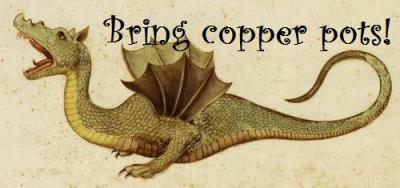
Artist Ulisse Aldrovandi, 16th century
Knight lunged at the sleeping dragon, his sword fully extended. Kill the wretched creature, his mind screamed, before he wakes up. Suddenly, the dragon opened his eyes and snatched the sword with his big teeth, wrenching it out of Knight’s hand. He’d kill me now, Knight thought and straightened up proudly. He wouldn’t bow to the monster, wouldn’t give him the satisfaction to see his fear.
The dragon ignored him. He chomped happily on the sword and swallowed loudly. Then he grabbed the shield, inspected it, and tossed it away, out of the cave, over Knight’s head.
“Wood,” the dragon rumbled disgustedly. “Your shield is wood. I don’t like wood. Next time bring copper pots. Much tastier.” Every R rolled in his chest like thunder. He closed his eyes again and put his big head down. Then he opened one eye. “You can go,” he said kindly.
Baffled, Knight stumbled out of the cave and picked up his wooden shield. It was cracked. Copper pots? The damn lizard wanted him to bring copper pots? What was he, a dragon’s gourmet cook? Seething with indignation, he started down the mountain path towards civilization. Would the dragon accept tin pots instead? They were much cheaper.
Happy Birthday!


October 16, 2014
Oscar Wilde said…
Reblogged from Interesting Literature
Oscar Wilde was born on this day, Oct 16, in 1854. Below are ten of the best Wildean one-liners.
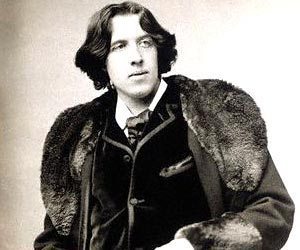
Oscar Wilde (author: anonymous), Wikimedia Commons, public domain.
I am so clever that sometimes I don’t understand a single word of what I am saying.
– The Remarkable Rocket
The books that the world calls immoral are the books that show the world its own shame.
– The Picture of Dorian Gray
To be really medieval one should have no body. To be really modern one should have no soul. To be really Greek one should have no clothes.
– A Few Maxims for the Instruction of the Over-Educated
Hard work is simply the refuge of people who have nothing whatever to do.
– The Remarkable Rocket
The final mystery is oneself. When one has weighed the sun in the balance, and measured the steps of the moon, and mapped out the seven heavens star by star, there still remains oneself. Who can calculate the orbit of his own soul?
– De Profundis
No great artist ever sees things as they really are. If he did, he would cease to be an artist.
– The Decay of Lying
When the gods wish to punish us, they answer our prayers.
– An Ideal Husband
Man is least himself when he talks in his own person. Give him a mask, and he will tell you the truth.
– The Critic as Artist
I love acting. It is so much more real than life.
– The Picture of Dorian Gray
Most people are other people. Their thoughts are someone else’s opinions, their lives a mimicry, their passions a quotation.
– De Profundis


October 15, 2014
Fantasy artists ��� a call to art
Lately, I���ve been fascinated by book covers in the genre I write ��� fantasy. There are some outstanding covers, highly original, but they are rare. Below are random examples of the covers I like.

 ��
��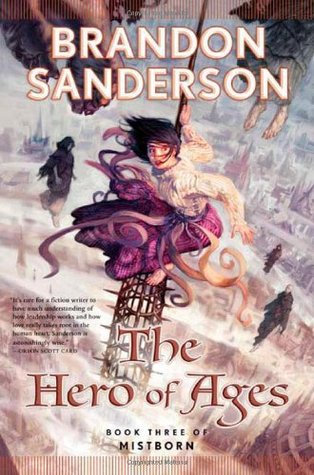
They all carry the atmosphere of the book they illustrate.
On the other hand, the majority of covers in the fantasy genre are mediocre, especially in the urban fantasy sub-genre. A half-naked girl with a tattoo plus a half-naked hunk with a sword (optional) comprise most of them. The trendy alternative is a guy in a swirling cloak. Created from stock photos, such covers are lamentably interchangeable. The artists don���t even read the books before they make covers for them. Pre-made covers are popular too, because those covers are neutral: one size fits all.
You might think that there are few talented fantasy artists out there, but that assumption is wrong. Websites like http://deviantart.com and http://pinterest.com are full of marvelous fantasy art. Their images take me to the worlds beautiful or scary, whimsical or gloomy, but always unique. I���d like to pay tribute to these artists, to introduce them to the wide-spread community of fantasy fans. I want to interview them on my blog.
If anyone who reads this post knows a fantasy artist or is a fantasy artist, I���d like to talk to you, to showcase your art. Please, contact me.


Fantasy artists – a call to art
Lately, I’ve been fascinated by book covers in the genre I write – fantasy. There are some outstanding covers, highly original, but they are rare. Below are random examples of the covers I like.



They all carry the atmosphere of the book they illustrate.
On the other hand, the majority of covers in the fantasy genre are mediocre, especially in the urban fantasy sub-genre. A half-naked girl with a tattoo plus a half-naked hunk with a sword (optional) comprise most of them. The trendy alternative is a guy in a swirling cloak. Created from stock photos, such covers are lamentably interchangeable. The artists don’t even read the books before they make covers for them. Pre-made covers are popular too, because those covers are neutral: one size fits all.
You might think that there are few talented fantasy artists out there, but that assumption is wrong. Websites like http://deviantart.com and http://pinterest.com are full of marvelous fantasy art. Their images take me to the worlds beautiful or scary, whimsical or gloomy, but always unique. I’d like to pay tribute to these artists, to introduce them to the wide-spread community of fantasy fans. I want to interview them on my blog.
If anyone who reads this post knows a fantasy artist or is a fantasy artist, I’d like to talk to you, to showcase your art. Please, contact me.


October 13, 2014
Nude Bargain on Wattpad
 I posted another short story on Wattpad. Nude Bargain is a science fiction story about a young art dealer in space. Could she save her ship and crew from the ruthless space pirates? What is art worth in space? Read and find out.
I posted another short story on Wattpad. Nude Bargain is a science fiction story about a young art dealer in space. Could she save her ship and crew from the ruthless space pirates? What is art worth in space? Read and find out.
Yes, nude sculptures are an intrinsic part of this story.





